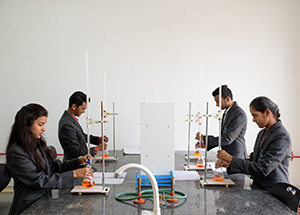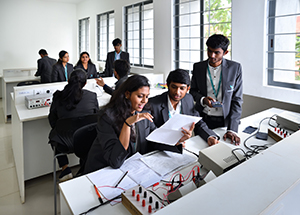I / II Semester (Physics Cycle)
- Math
- Physics
- Element of Electrical Engineering
- Element of Civil Engineering
- CAED
- Common Core
Announcements
Students can obtain the Honors program by earning 20 additional credits.
Career Opportunities
4 Years (8 Semesters)
Full Time
Candidate who has Passed 2nd PUC / 12th Grade / Equivalent Exam with English as one of the Languages and obtain a minimum of 45% of marks in aggregate in Physics and Mathematics along with Chemistry / Biotechnology / Biology / Electronics / Computers (40% for reserved category candidates). Candidate must also qualify in one of the following entrance exams:- AIEEE / JEE / CET / COMED-K / CMRUAT or any other equivalent entrance examination conducted by recognized Institution / Agency.
For Diploma Holders
Diploma holders in Engineering with a minimum of 50% marks in the final examination, conducted by the Board of Technical Examination, Government of Karnataka or its equivalent, are eligible for admission to the corresponding branch of Second Year Engineering.
The Civil Engineering syllabus for each semester in CMR University is as follows:

The Engineering Chemistry Lab has facilities to conduct experiments to bridge the knowledge on analytical, inorganic and physical chemistry. A highlight of this lab is the use of different chemical indicators to monitor the titrations experiments and various instrumentation facilities are available for the experiments related to electrochemistry. Advanced experiments in utilizing the smart phone as an alternative to Colorimeter is also attempted in our lab which expand the scope of engineering chemistry lab. Also, modified Fenton process is also carried out using iron powder from the prospect of wastewater treatment.

The Engineering Physics laboratory imparts skill in experimental method to the first year students of B.Tech. Programme. Students are trained to set up the experiments, carry out measurements, analyze the observations, obtain results and draw appropriate conclusions. The laboratory experiments supplement the theory courses so that the students will be in a position to understand the concepts learnt in the theory course.
The University follows Choice Based Credit System (CBCS), which provides choice for students to select from the prescribed set of courses and earn credits. Students are awarded grades based on their performance for each courses in a semester and Semester Grade Point Average (SGPA), which is a measure of academic performance of a student in a semester. Cumulative Grade Point Average (CGPA) is used as a measure of overall cumulative performance of a student over all semesters. However, the CGPA is invariably calculated from second semester onwards to facilitate students to know their academic progress.
Every Programme has a prescribed Curriculum or the Scheme of Teaching and Evaluation. It prescribes all the courses/ laboratory/ other requirements for the degree and sets out the nominal sequence semester wise. Curriculum also includes SWAYAM and Massive Open Online Courses (MOOCs), offered by premier institutions. A student desirous of additional exposure to a course, without the rigors of obtaining a good grade, ‘audits’ a course that helps him to have an edge over others in placements.
The evaluation system to assess the student is comprehensive and continuous during the entire period of Semester, by the faculty who is teaching the course. Continuous Internal Evaluation (CIE) and Semester End Examination (SEE) constitute the major evaluations prescribed for each course, with only those students maintaining a minimum standard in CIE are permitted to appear in SEE of the course. CIE and SEE to carry 50% weightage each, to enable the course to be evaluated for a total of 100 marks, irrespective of its credits.
Before the start of the Academic session of each semester, a faculty may choose for his course Internal Assessment Test and a minimum of two of the following assessment methods with suitable weightage for each: Assignments (Individual and/or Group), Seminars, Quizzes, Group Discussions, Case studies/Case lets, Practical orientation on Design Thinking, Creativity & Innovation, Participatory & Industry-integrated learning, Practical activities / problem solving exercises, Class presentations, Analysis of Industry/Technical/Business Reports, Reports on Guest Lectures / Webinars / Industrial Visits, Industrial / Social / Rural projects, Participation in Seminars/ Academic Events/Symposia, etc. or any other academic activity.
The Semester End Examination for all the courses for which students registered during the semester shall be conducted at the end of each semester. Some of the courses, where the student performance is evaluated through CIE, may not have SEE.
The makeup examination facility shall be available to those students who have appeared and failed in the SEE in one or more courses in a semester.